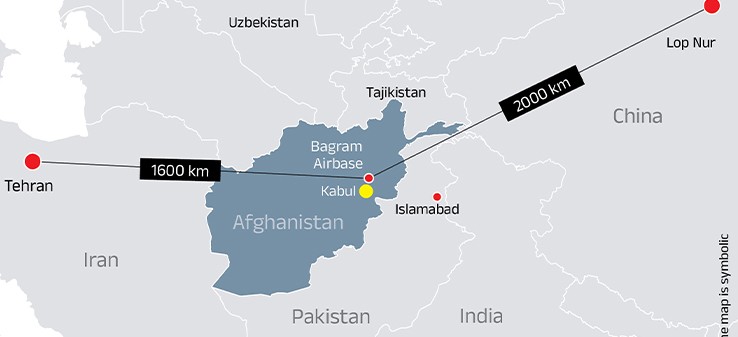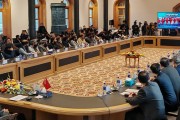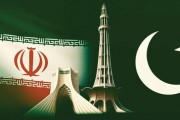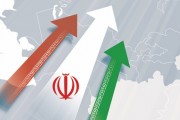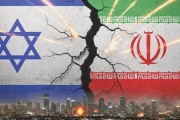Publish Date
Wednesday 19 November 2025 - 10:30
recommended
0
Central Asia and U.S. Return to Bagram
Central Asia’s View of a Possible U.S. Return to Bagram
The cautious yet coordinated reaction of Central Asian states to the idea of a U.S. return to Bagram is not an emotional stance, but the result of a precise and strategic cost–benefit analysis. These countries, carrying a heavy load of historical experience and a deep understanding of their geopolitical environment, have concluded that a renewed U.S. military presence would not bring stability; rather, it would drag the region into destructive great-power rivalries, fuel extremism, and challenge their independence.
By: Mohammad Hossein Masoumzadeh
5 Minutes Reading
The recent remarks by Donald Trump, President of the United States, about the need to retake the Bagram airbase have sparked considerable sensitivity. Bagram, the military fortress that once symbolized Western projection of power in Afghanistan, has now become a focal point for measuring the new regional security dynamics. Washington’s request—justified on the grounds of monitoring rivals and counterterrorism—has been met with deep reluctance and cautious convergence from regional states, especially the Central Asian republics. Without necessarily issuing direct or forceful statements, these countries have reached an unwritten consensus that any deployment of foreign military infrastructure in their neighborhood would disrupt the fragile balance of peace and stability in the region.
The Moscow Format: A Manifestation of a Shared Concern
The focal point of this regional caution was the joint statement of the seventh meeting of the Moscow Format Consultations on Afghanistan This meeting, which brought together regional countries including Kazakhstan, Kyrgyzstan, Tajikistan, and Uzbekistan, resulted in a statement that explicitly called unacceptable “the attempts by countries to deploy their military infrastructure in Afghanistan and neighboring states, since this does not serve the interests of regional peace and stability.”
Without naming the United States, this clause directly targeted the idea of returning to Bagram. The significance of this approach lies in the fact that Central Asian states, by relying on this collective framework, avoided the political cost of a bilateral confrontation with Washington. According to Taimur Khan, a researcher at the Institute of Strategic Studies Islamabad (ISSI), this convergence shows that despite their differences, the countries of the region share a common position that Afghanistan must not once again host foreign military presence. The gathering of states—some with competing interests—around a shared security concern reveals the depth of their apprehension about the military return of an extra-regional power to a security environment that directly affects them. Notably, this stance is less an active opposition and more of a preventive warning—a cautious effort to keep a potential crisis away from their borders.
Dissecting Central Asia’s Reluctance: Reasons Beyond Diplomacy
The implicit and cautious opposition of the Central Asian republics to a U.S. return to Bagram stems from a set of complex security calculations, old historical wounds, and geopolitical realism, detailed below:
1. Fear of Being Caught in the Crossfire: The Trap of Great-Power Rivalry
Trump cites Bagram’s proximity to China as the main reason for retaking the base. For Central Asian countries, the greatest nightmare is becoming the chessboard of intensifying U.S.–Russia–China rivalry.
As regional analysts note, a U.S. base would inevitably place host and neighboring states on the front line of this confrontation. Such a presence would automatically convert the region into a theater of direct contestation and expose these republics to reciprocal economic and security pressures from Moscow and Beijing. Central Asian states, which carefully attempt to walk a path of strategic neutrality, know well that aligning with one power brings costs they cannot afford. This is not an ideological choice but a logical calculation for survival beside great powers.
2. Priority Given to Regional Security Architecture
In recent years, these countries have invested their political and security resources in regional frameworks such as the Shanghai Cooperation Organisation (SCO) and the Collective Security Treaty Organization (CSTO). Despite their shortcomings, these organizations provide a familiar and predictable environment for security coordination. From the perspective of these governments, a U.S. return could disrupt the emerging regional order and weaken the mechanisms they deem essential for current relative stability. Their preference is for stability through regional cooperation and economic integration, not a return to the era of Western intervention, which left behind little but instability.
3. The Shadow of the Karshi-Khanabad Base: A Lesson Not Forgotten
To understand the depth of Central Asia’s strategic distrust of U.S. military presence, one must return to the region’s historical memory. For example, the experience of the Karshi-Khanabad airbase in Uzbekistan, used by U.S. forces from 2001 to 2005, was a determining turning point. This cooperation—initially founded on shared interests in the war on terror and elevated by the 2002 Strategic Partnership Declaration—quickly soured after the bloody events of Andijan in May 2005. Washington’s political pressure on Uzbekistan and the subsequent expulsion of U.S. forces taught regional leaders that an American military presence could become a lever for interference in domestic affairs and political instability.
Such an experience has been institutionalized in regional defense doctrines. Uzbekistan, in its Foreign Policy Concept and military doctrine, explicitly establishes the prohibition of the deployment of foreign military bases and facilities on its soil as a legal principle. This principle—emphasized by then Foreign Minister Abdulaziz Kamilov in 2021—is both a legal barrier and a reflection of the region’s resolve to preserve strategic autonomy.
4. The Counterterrorism Paradox: Fuel for the Fire of Extremism
While one of Washington’s reasons for returning to Bagram is combating groups such as ISKP, regional countries see the equation differently. From their perspective, the renewed presence of foreign troops in Afghanistan would provide extremist groups with the perfect propaganda tool. These groups could exploit this pretext to recruit from among disgruntled individuals and radicals across the region and inflame insecurity. Central Asian countries, whose long and vulnerable borders place them on the front line of this threat, are unwilling to accept such a high risk.
5. The Geo-economic Outlook vs. Geopolitical Realities
Opposition to a renewed U.S. military presence also has a critical geo-economic dimension. Central Asian states envision their future not in militarization but in becoming a hub of connectivity and transit at the heart of Eurasia. Initiatives such as the Trans-Afghan Railway—which aims to connect Central Asia to warm-water ports in the south—are vital for them. These projects require a secure, stable environment free of geopolitical tension.
A renewed U.S. presence in Bagram directly threatens this economic vision. Such a presence could challenge infrastructure projects, especially those tied to America’s rivals—such as China’s Belt and Road Initiative (BRI) —and once again turn Afghanistan into a center of instability and competition.
Conclusion: Preferring Predictable Stability Over Costly Intervention
The cautious yet coordinated response of Central Asian countries to the idea of a U.S. return to Bagram is not an emotional stance, but the product of a careful and strategic cost–benefit calculation. With extensive historical experience and a deep understanding of their geopolitical setting, these states have concluded that a renewed U.S. military presence would not bring stability; instead, it would draw the region into destructive great-power rivalries, fuel extremism, and challenge their autonomy.
The Moscow Format statement is less an indictment of a particular country and more a defense of a principle: “regional solutions for regional problems.” This could mark a new chapter in Eurasian security history—one in which local actors, albeit cautiously and reluctantly, strive to take charge of their own destiny and avoid repeating the tumultuous history of the past. Today, Bagram is no longer merely a military base; it is a symbol of this geopolitical transition—from imported security toward a model that may be fragile, but is indigenous and rooted in the will of the region itself.
Mohammad Hossein Masoumzadeh; PhD student in Central Asian and Caucasus Studies
5 Minutes Reading
The recent remarks by Donald Trump, President of the United States, about the need to retake the Bagram airbase have sparked considerable sensitivity. Bagram, the military fortress that once symbolized Western projection of power in Afghanistan, has now become a focal point for measuring the new regional security dynamics. Washington’s request—justified on the grounds of monitoring rivals and counterterrorism—has been met with deep reluctance and cautious convergence from regional states, especially the Central Asian republics. Without necessarily issuing direct or forceful statements, these countries have reached an unwritten consensus that any deployment of foreign military infrastructure in their neighborhood would disrupt the fragile balance of peace and stability in the region.
The Moscow Format: A Manifestation of a Shared Concern
The focal point of this regional caution was the joint statement of the seventh meeting of the Moscow Format Consultations on Afghanistan This meeting, which brought together regional countries including Kazakhstan, Kyrgyzstan, Tajikistan, and Uzbekistan, resulted in a statement that explicitly called unacceptable “the attempts by countries to deploy their military infrastructure in Afghanistan and neighboring states, since this does not serve the interests of regional peace and stability.”
Without naming the United States, this clause directly targeted the idea of returning to Bagram. The significance of this approach lies in the fact that Central Asian states, by relying on this collective framework, avoided the political cost of a bilateral confrontation with Washington. According to Taimur Khan, a researcher at the Institute of Strategic Studies Islamabad (ISSI), this convergence shows that despite their differences, the countries of the region share a common position that Afghanistan must not once again host foreign military presence. The gathering of states—some with competing interests—around a shared security concern reveals the depth of their apprehension about the military return of an extra-regional power to a security environment that directly affects them. Notably, this stance is less an active opposition and more of a preventive warning—a cautious effort to keep a potential crisis away from their borders.
Dissecting Central Asia’s Reluctance: Reasons Beyond Diplomacy
The implicit and cautious opposition of the Central Asian republics to a U.S. return to Bagram stems from a set of complex security calculations, old historical wounds, and geopolitical realism, detailed below:
1. Fear of Being Caught in the Crossfire: The Trap of Great-Power Rivalry
Trump cites Bagram’s proximity to China as the main reason for retaking the base. For Central Asian countries, the greatest nightmare is becoming the chessboard of intensifying U.S.–Russia–China rivalry.
As regional analysts note, a U.S. base would inevitably place host and neighboring states on the front line of this confrontation. Such a presence would automatically convert the region into a theater of direct contestation and expose these republics to reciprocal economic and security pressures from Moscow and Beijing. Central Asian states, which carefully attempt to walk a path of strategic neutrality, know well that aligning with one power brings costs they cannot afford. This is not an ideological choice but a logical calculation for survival beside great powers.
2. Priority Given to Regional Security Architecture
In recent years, these countries have invested their political and security resources in regional frameworks such as the Shanghai Cooperation Organisation (SCO) and the Collective Security Treaty Organization (CSTO). Despite their shortcomings, these organizations provide a familiar and predictable environment for security coordination. From the perspective of these governments, a U.S. return could disrupt the emerging regional order and weaken the mechanisms they deem essential for current relative stability. Their preference is for stability through regional cooperation and economic integration, not a return to the era of Western intervention, which left behind little but instability.
3. The Shadow of the Karshi-Khanabad Base: A Lesson Not Forgotten
To understand the depth of Central Asia’s strategic distrust of U.S. military presence, one must return to the region’s historical memory. For example, the experience of the Karshi-Khanabad airbase in Uzbekistan, used by U.S. forces from 2001 to 2005, was a determining turning point. This cooperation—initially founded on shared interests in the war on terror and elevated by the 2002 Strategic Partnership Declaration—quickly soured after the bloody events of Andijan in May 2005. Washington’s political pressure on Uzbekistan and the subsequent expulsion of U.S. forces taught regional leaders that an American military presence could become a lever for interference in domestic affairs and political instability.
Such an experience has been institutionalized in regional defense doctrines. Uzbekistan, in its Foreign Policy Concept and military doctrine, explicitly establishes the prohibition of the deployment of foreign military bases and facilities on its soil as a legal principle. This principle—emphasized by then Foreign Minister Abdulaziz Kamilov in 2021—is both a legal barrier and a reflection of the region’s resolve to preserve strategic autonomy.
4. The Counterterrorism Paradox: Fuel for the Fire of Extremism
While one of Washington’s reasons for returning to Bagram is combating groups such as ISKP, regional countries see the equation differently. From their perspective, the renewed presence of foreign troops in Afghanistan would provide extremist groups with the perfect propaganda tool. These groups could exploit this pretext to recruit from among disgruntled individuals and radicals across the region and inflame insecurity. Central Asian countries, whose long and vulnerable borders place them on the front line of this threat, are unwilling to accept such a high risk.
5. The Geo-economic Outlook vs. Geopolitical Realities
Opposition to a renewed U.S. military presence also has a critical geo-economic dimension. Central Asian states envision their future not in militarization but in becoming a hub of connectivity and transit at the heart of Eurasia. Initiatives such as the Trans-Afghan Railway—which aims to connect Central Asia to warm-water ports in the south—are vital for them. These projects require a secure, stable environment free of geopolitical tension.
A renewed U.S. presence in Bagram directly threatens this economic vision. Such a presence could challenge infrastructure projects, especially those tied to America’s rivals—such as China’s Belt and Road Initiative (BRI) —and once again turn Afghanistan into a center of instability and competition.
Conclusion: Preferring Predictable Stability Over Costly Intervention
The cautious yet coordinated response of Central Asian countries to the idea of a U.S. return to Bagram is not an emotional stance, but the product of a careful and strategic cost–benefit calculation. With extensive historical experience and a deep understanding of their geopolitical setting, these states have concluded that a renewed U.S. military presence would not bring stability; instead, it would draw the region into destructive great-power rivalries, fuel extremism, and challenge their autonomy.
The Moscow Format statement is less an indictment of a particular country and more a defense of a principle: “regional solutions for regional problems.” This could mark a new chapter in Eurasian security history—one in which local actors, albeit cautiously and reluctantly, strive to take charge of their own destiny and avoid repeating the tumultuous history of the past. Today, Bagram is no longer merely a military base; it is a symbol of this geopolitical transition—from imported security toward a model that may be fragile, but is indigenous and rooted in the will of the region itself.
News code:4177
Author : Mohammad Hossein Masoumzadeh PhD student in Central Asian and Caucasus Studies
Source : East Studies




